THE WEEK IN REVIEW
April 1-7, 2024

Corina Cristea, 06.04.2024, 14:00
Romania partially joins Schengen
On March 31st Romania joined the Schengen area, but only with its sea and
air borders. At the 17 international airports, as well as in the 4 ports on the
Black Sea, as of last Sunday, people coming from or going to a country in the
free movement area no longer have their travel documents checked.
However, the police can do random checks in order to identify those who have
fake travel documents, who are prohibited from leaving the country, to track
down wanted persons, to verify compliance with the rules on accompanying
minors, to combat migration and human trafficking.
For the time being, the land routes remain outside Schengen, due to Austria's
veto, attributed in particular to internal electoral calculations. From Brussels,
the European Commission has given assurances that it will make every effort
so that a favorable decision regarding accession with the land borders is
made this year.
In Romania, from politicians to ordinary citizens, the entry, even if partial, into
the free movement area was warmly welcomed. The social-democratic Prime
Minister Marcel Ciolacu has stated that the Government has a clear and firmly
assumed plan for full accession by the end of 2024. This perspective,
however, depends on several factors, including external political
developments and circumstances that are not in Romania’s sphere of
diplomatic intervention, said the Minister of the Interior, Cătălin Predoiu.
20 years of NATO membership
Romania's 20 years of NATO membership, as well as the 75th anniversary of
the North Atlantic Alliance, were celebrated on Tuesday in Bucharest, through
a solemn joint meeting of the two chambers of Parliament. Deputies and
senators adopted a declaration emphasising that Romania’s NATO
membership is a guarantee for the protection of its citizens, democracy and
individual freedoms.
Senate speaker and leader of the National Liberal Party, reserve general
Nicolae Ciucă said that in its 20 years of NATO membership, Romania has
become a key member of the Alliance. For Romania, entering NATO was the
fulfilment of a historical aspiration and a security imperative, said foreign
minister Luminița Odobescu, who attended the events held in Brussels to
mark NATO’s 75 th anniversary.
A poll conducted by the Romanian Institute for Evaluation and Strategy
indicates that over 80% of Romanian respondents believe their countries’
joining NATO was a good thing and that its allies would defend it in the event
of a threat.
In Bucharest, about the European Union
A working meeting was held this week in Bucharest on the priorities of the
European Union over the next five years, also attended by the prime ministers
of Belgium, Hungary and Croatia and hosted by the Romanian president
Klaus Iohannis and the president of the European Council Charles Michel.
Talks looked at actions to achieve common objectives to consolidate the
Union’s profile, a process to which, according to president Iohannis, Romania
can have a significant contribution.
The European Union last year began a process to define its strategic
priorities, with some of the themes identified including security and defence,
enlargement, resilience and competitiveness, energy and migration. The
Strategic Agenda for the next institutional cycle, 2024-2029, is to be adopted
by the European Council at a meeting at end of June.
Anti-deepfake guide
To raise awareness over cyber security risks, the National Cyber Security
Directorate launched a guide to help people in Romania identify deepfake
content. The guide contains detailed information about what deepfake means,
the process of making it and how such materials can be identified. Available
on the dnsc.ro website, the guide also teaches Romanians what to do if they
fall victim to a deepfake.
With Romania holding four types of elections this year, the National Cyber
Security Directorate warns that the digital field can become a complex terrain
of ideological struggle and deepfake technologies, which are capable of
almost perfectly reproducing images and voices, can significantly influence
the opinion and vote of the electorate.
The National Bank of Romania and the key interest rate
The National Bank of Romania on Thursday decided to maintain the key
interest rate at 7% per year, at the same level as in the last one year and four
months. It also maintained the levels of interest rate at which commercial
banks can borrow from the National Bank and those received by the latter for
their deposits at the central bank. According to the National Bank’s forecasts,
the annual inflation rate grew in January to 7.41% before seeing a slight
decrease in February, to 7.23%.
According to current estimates, the inflation rate will continue to drop,
although amid the uncertainties and risks related to the fiscal measures taken
recently to support the budget consolidation process and the capping of
markups on basic food products. Further uncertainty about the long-term
evolution of the inflation rate is caused by the war in Ukraine, the conflict in
the Middle East and economic developments in Europe, especially in
Germany.



























